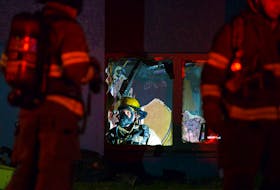It may be long overdue and welcome, but Rex Freake still has some concerns about consolidating the various pieces of legislation governing ambulance services in Newfoundland and Labrador.
The province is the only jurisdiction in Canada currently without specific legislation governing the delivery of ambulance services.
The laws relevant to delivery of ambulance services in the province are scattered across a half dozen or so statutes and sets of regulations that are all governed by just as many public entities.
This week, the province’s Department of Health and Community Services is holding a series of public consultations on drafting legislation that would bring all of the legislation into one act governed by the department.
Those sessions, which began in St. John’s Monday, were in Corner Brook Tuesday.
Freake has been in the industry for 40 years and owns or co-owns several private ambulance operations on the island, including Reliable Ambulance in Corner Brook. He and his business partner, Bob Fewer — also a co-owner of Reliable Ambulance — are planning to attend all five of the sessions scheduled on the island.
They likely won’t attend the one in Labrador on Friday as neither of them have operations there and it is being held simultaneously with the one in Clarenville.
Freake, who is based out of Lewisporte, has been fighting for an ambulance act for years. While he’s glad legislation seems to be just around the proverbial corner, he is worried about how the service will look like if services are to go to public tender in the spring of 2020.
“Does that mean there will only be one operator, two operators, three?” he wondered. “Putting together an ambulance act that is good, when you don’t know the future of where ambulance services are going, to me, is hard to do.”
He said there should be a combination of bringing the various bits and pieces of current legislation together mixed in with some legislative changes to improve the service.
“Until I see a copy of what they’re going to propose, it’s hard to be able to comment on whether the legislation they’re going to put in place is going to be good, bad or indifferent,” he said. “Right now, it’s all over the place. It needs to be done and put in place, but where they are going with ambulance services, no one really knows and there’s only a short period time to try and change the system.”
A 2013 report assessing Newfoundland and Labrador’s ambulance service can be found here: https://www.health.gov.nl.ca/health/publications/nl_ambulance_review.pdf 3
To, register for a session, view the discussion guide or provide a written submission online, visit www.engagenl.ca
Some key statistics of the Provincial Road Ambulance Program that currently provides emergency and routine (inter-facility) patient transfers:
· Around 80,000 ambulance transports were completed in fiscal year 2017-18.
· The Board of Commissioners of Public Utilities has issued 61 licenses to operate road ambulance services in the province as follows:
- 13 are operated by regional health authorities
- 26 are operated privately
- 22 are operated by communities (not for profit)
· The 61 operators receive funding from the provincial government to operate a combined total of 179 ambulances throughout the province.
· 830 ambulance professionals are employed by the 61 operators.
· The provincial budget for the program was around $61.5 million in fiscal year 2017-18.
At this time, components of the program are governed by the following statues and regulations:
· Health and Community Services Act;
· Highway Traffic Act and Ambulance, Bus, School Bus, Taxi and Commercial Motor Vehicle Insurance Regulations;
· Licensing and Equipment Regulations;
· Motor Carrier Act and Motor Carrier Regulations; and
· Regional Health Authorities Act and Regional Health Authorities Regulations.
By virtue of the various pieces of legislation and regulations referenced above, the program is governed by multiple entities:
- Department of Health and Community
- Board of Commissioners of Public Utilities (PUB)
- Regional Health Authorities
- Provincial Medical Oversight Office
- Service NL (Highway Enforcement
- Service NL (Occupational Health and Safety
Components of the proposed legislation
It is envisioned that the proposed new legislation will consolidate responsibility for the program, in its entirety, to Health and Community Services. The Department may then delegate responsibilities to other organizations such as regional health authorities. Health and Community Services is proposing to include at least the following six elements in the new legislation:
1. Licensing of Ambulance Services
2. Identification of Ambulance Professional Qualifications
3. Medical Direction and Quality Assurance
4. Identification of Emergency Medical Vehicles
5. Establishing Medical Vehicle Standards
6. Operator Performance Standards and Responsibilities
Source: Department of Health and Community Services









